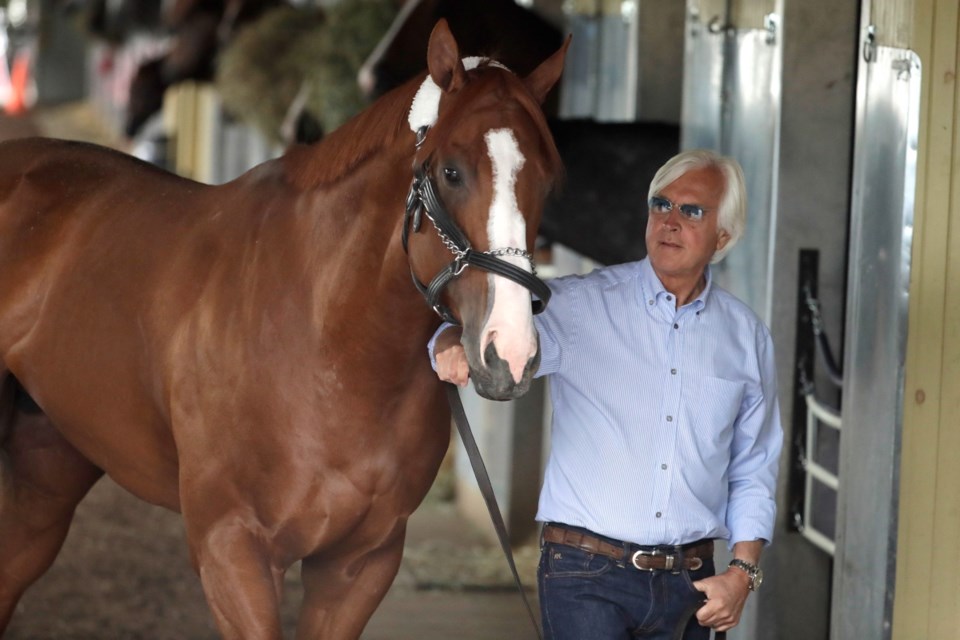VANCOUVER — Dads are notoriously hard to buy for. On Father’s Day there are lots of ties and socks gifted, maybe the odd bottle of Crown Royal.
Or how about a Triple Crown? That was the early Father’s Day gift Langley’s John D. Gunther got when the horse his daughter bred, Justify, completed the hat trick by winning the Belmont Stakes on June 9.
“It hasn’t sunk in, it’s like: ‘Did that really happen?’ if you know what I mean,” Tanya Gunther said over the phone from the family’s Glennwood Farm in Versailles, Kentucky.
She left a career in investment banking to return to her roots and her passion, running her dad’s stable in Versailles, and doing the genealogical sleuthing that ultimately resulted in Justify.
Gunther and her elder sister, Nicky, grew up surrounded by ponies, jumpers, race mares, you name it, on the family farm in Langley, and with trips to Hastings Park, sometimes three times a week.
“We bred horses on a small scale and it just grew into a bad habit, my dad always says,” Tanya Gunther said, laughing.
She has fond memories of trips to the track on Renfrew, her little brother Spud digging through the discarded betting slips on the floor to see if someone had thrown away a winner by mistake, jaunts down to watch the horses bolt from the starting gate, then stopping for fries on the trip back to their seats.
Gunther grew up, got a commerce degree from the University of British Columbia, then a master’s from the London Business School and a job with Lehman Brothers, a one-time, huge, global-investment bank.
“Crazy, huh?” she said of leaving the corporate world for the pastoral life of a horse breeder, but surely there’s more fun to be had surrounded by animals you love in a bucolic setting than sitting in a bank office in London?
“There sure is,” Gunther said. “But oddly enough, there’s a fair bit of stress in it as well.” Such as the behind-the-scenes goings-on not shown during Triple Crown broadcasts. That the reward/loss ratio is personal makes it, if anything, more stressful than the world of finance, Gunther said.
“You’re dealing with life and death a lot, trying to keep these babies alive when they’re born. In some ways, it’s the ultimate stress,” she said.
There are mares struggling during birth, foals struggling to survive and not succeeding. The weekend of the Kentucky Derby, Gunther was in and out of the vet clinic. A foal sired by American Pharaoh, the last Triple Crown winner before Justify became the 13th, had to be put down because of a heart defect.
“I went into this because I love horses. To see something like that is heartbreaking. And then there’s the element of what could have been with that horse,” she said.
Monetarily, you pay a stud fee, but that stallion can sire dozens of foals per year. (Justify’s breeding rights, it was just announced, were sold for a record $75 million US.) A mare, on the other hand, has one foal a year.
Of the 10 horses Glennwood Farm had sold as yearlings two years ago, two made it to the Derby and to the Belmont: Vino Rosso was also bred by Gunther.
Trace it back to Gunther’s diligence and research into genealogy. Glennwood Farm, for instance, paid just $35,000 for Scat Daddy to breed with the farm’s mare, Stage Magic. Her keen eye saw what others only later picked up on, driving Scat Daddy’s stud fee to $150,000.
It’s a combination of girlhood fascination with racing forms, and an investment banker’s love of spreadsheets. “As a girl, we had a family friend who was into horse racing,” said Gunter, 46. “Every weekend, he’d visit and bring these various brochures about stallions and so forth. I was so young I barely knew what I was looking at, but I would go through all the generations they’d show on the pedigree papers.”
She’d collect racing posters. She bought two made-to-order T-shirts from the Dog’s Ear in Langley, one blue and one yellow, that featured the mythical Pegasus and, on the back, Man o’ War, the winner of the 1920 Preakness and Belmont. “You couldn’t get me out of those T-shirts,” she said. Growing up in Langley was perfect, Gunther said, pure horse heaven.



